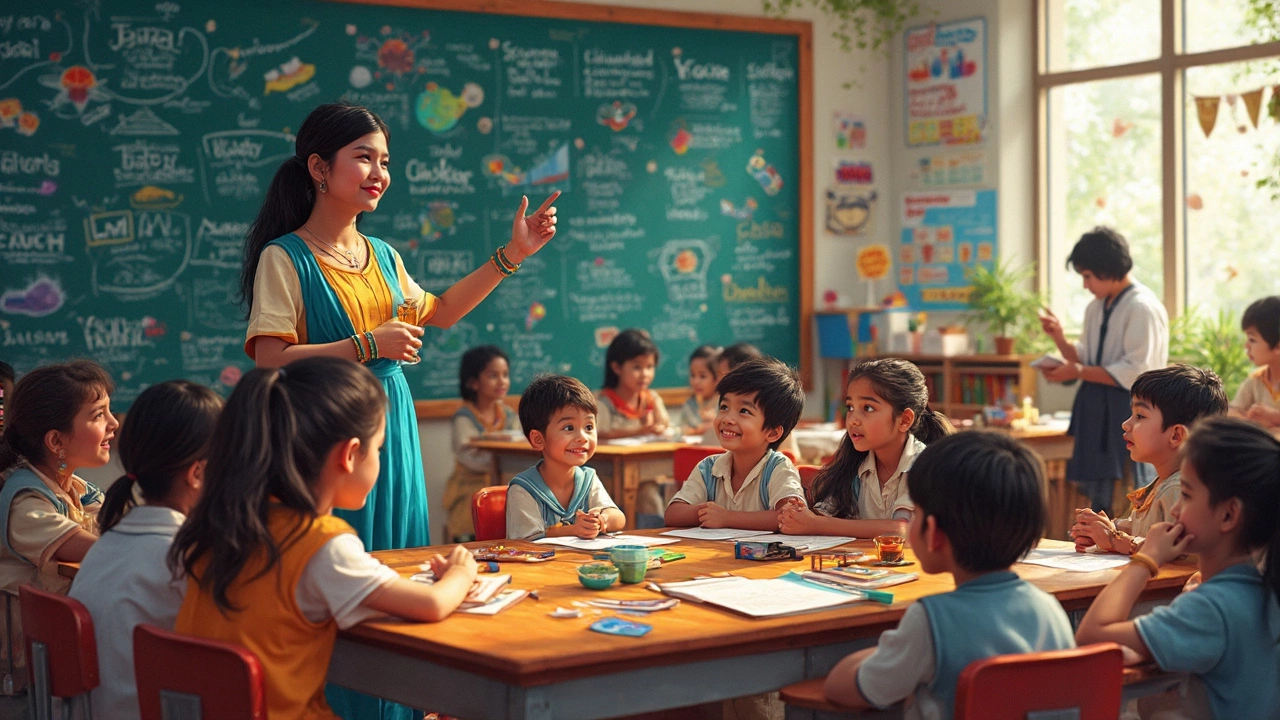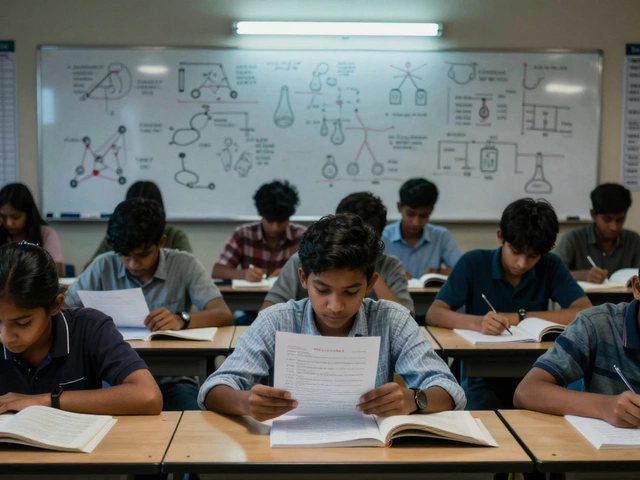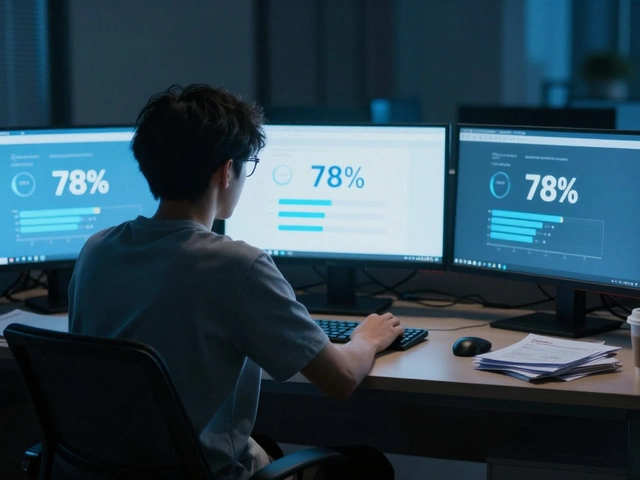So, ever wondered what the big deal is with the CBSE syllabus in India? If you've got kids in school or just curious about India's education system, it's something you want to get a hang of. The Central Board of Secondary Education (CBSE) is like the backbone for many schools across the country, from bustling cities to small towns.
At its core, the CBSE syllabus is designed to give students a solid foundation, covering everything from the arts to hardcore sciences. It doesn’t just cram info down students’ throats; it also helps them think critically and solve problems. This comes super handy, especially if kids are eyeing universities or dreaming big about global careers.
But wait, there’s more. The CBSE isn’t just about textbooks and exams. They’ve been shaking things up to make learning more fun and meaningful. Whether you're a parent trying to keep up or a student aiming to ace your boards, knowing the ins and outs of this syllabus can be a game-changer. Let’s dig in deeper and see what makes it tick and how you can make the most out of it!
- Overview of CBSE Board
- Primary and Secondary Education
- Strengths of CBSE Syllabus
- Tips for Students and Parents
Overview of CBSE Board
The Central Board of Secondary Education (CBSE) is one of the most prominent education boards in India, setting the benchmark for schools across the country. Established in 1962, the board operates under the Ministry of Education and is responsible for conducting exams and laying down guidelines for schools.
What makes CBSE stand out is its standardized approach. This means that no matter where you are in India, if you're following the CBSE syllabus, you're likely learning the same stuff. That's a big plus for families constantly on the move.
CBSE is not just about academics. It encourages a holistic education. The idea is to prepare students not only for higher studies but life in general. They focus on co-curricular activities like sports, arts, and dramatics, which aim to polish social and leadership skills.
The board conducts important examinations like the All India Senior School Certificate Examination (AISSCE) for 12th graders and the All India Secondary School Examination (AISSE) for 10th graders. Students rely heavily on these exams since they open doors to universities and colleges.
CBSE also plays a critical role in entrance exams like the Joint Entrance Examination (JEE) for engineering and the National Eligibility cum Entrance Test (NEET) for medical admissions. So, if engineering or medicine is on a student's career list, understanding the CBSE syllabus is a must.
All these factors make the CBSE board an appealing choice for students looking for a structured and comprehensive educational experience. Updating and modernizing the syllabus regularly, CBSE aligns with global standards, giving students a competitive edge.
| Year Established | Exams Conducted |
|---|---|
| 1962 | 10th & 12th Board Exams, JEE, NEET |
Primary and Secondary Education
Alright, let's break down what primary and secondary education under the CBSE syllabus is all about in India. Aiming to provide an all-rounded education, CBSE doesn’t just focus on academics. They want kids to also gain life skills that’ll stick with them beyond school.
In the primary years, which cover grades 1 to 5, CBSE emphasizes on building a strong foundation in subjects like math, science, and languages. It’s more about grasping concepts rather than rote memorization. They strike a balance between learning and fun, using artwork and activities to keep things interesting.
Moving onto secondary education, covering grades 6 to 10, things get a bit more focused and detailed. Students dive deeper into subjects. English, Hindi, mathematics, and science play a big part, but they also explore social science subjects like history and geography. This stage is crucial because it sets the stage for their future academic paths—whether they’re leaning toward science, commerce, or humanities in higher classes.
One cool thing CBSE does is keeping their textbooks updated with new information and methods. They've got initiatives to focus on skill development with a bunch of co-curricular activities. This way, kids don’t just learn for exams but actually engage with the content. What's more, CBSE schools regularly hold workshops and projects that are designed to encourage critical thinking and problem-solving.
- Key Subjects in Primary: Math, Science, Arts, and Languages.
- Key Subjects in Secondary: English, Mathematics, Science (Physics, Chemistry, Biology), and Social Science.
Understanding this structure helps both parents and students know what to expect and how to plan ahead. The CBSE board continuously tweaks the syllabus to keep pace with changing educational needs, so staying in the loop can really help make the most out of these years!

Strengths of CBSE Syllabus
When it comes to education in India, the CBSE syllabus sits right at the top for a good reason. One major perk is its consistency. No matter where a student is in India, the learning material stays the same. This means if a family moves from Delhi to Mumbai, the transition is smooth, and students can pick up right where they left off.
The CBSE board focuses heavily on Science and Math, preparing students for future competitive exams like JEE and NEET. Many students find this focus extremely useful when gearing up for those high-pressure entrance tests. It’s like having a firm grip on the basics before diving into deeper waters.
Beyond textbooks, the CBSE syllabus encourages a thinking-out-of-the-box attitude. It’s not all about mugging up info. The curriculum includes project work and practical applications, pushing students to get creative with their knowledge. Kids learn to tackle real-world problems, which is pretty cool! This approach helps build confidence, making them not just book-smart but life-smart too.
Check this out—many international schools follow the CBSE pattern, too. That says something about its global acceptance and adaptability. If you’re planning to move overseas, kids familiar with the CBSE system often adjust better to other educational systems than those from other boards.
Here's a fun nugget: In recent surveys, students and parents have shown high satisfaction with the balance CBSE maintains between academics and extracurriculars. This gives students space to explore interests beyond the classroom, from sports to arts.
Understanding and leveraging these strengths of the CBSE syllabus can truly enhance a student's educational journey. From setting a consistent pace across the country to encouraging analytical skills and creativity, CBSE sure sets the foundation for a promising future.
Tips for Students and Parents
Navigating the CBSE syllabus can feel like a bit of a rollercoaster ride, but with a few handy tips, it can be way more manageable. Whether you're a student gearing up for exams or a parent trying to stay on top of it all, there's a strategy for you. Let’s dive into some practical advice.
For Students:
- Start with a Plan: Use a calendar to mark important dates and set deadlines for different topics. A clean, organized plan helps you avoid last-minute chaos. Look at it like your personal GPS for the CBSE syllabus.
- Understand, Don’t Memorize: CBSE focuses on conceptual learning, so try to grasp the 'why' and 'how' rather than just the 'what.' It's about turning knowledge into power!
- Use Sample Papers: CBSE releases sample papers every year. A sneak peek at these can give you a feel of the exam pattern and the types of questions to expect.
- Stay Healthy: It sounds cliché, but regular breaks, exercise, and good sleep can do wonders. Your brain needs fuel—not just from books but from a balanced lifestyle.
"The CBSE curriculum is more than just academics; it prepares you for life," says Shweta Malik, an education consultant with 20 years of experience, "Focusing on understanding rather than rote memorization is key."
For Parents:
- Be Supportive: Get involved in your child's routine. Ask about their day, help with organization, and create a positive study environment at home.
- Stay Informed: Keep an eye on CBSE notifications and curriculum changes. Websites and school teachers are your go-to resources for updates.
- Encourage Extracurriculars: CBSE isn't just about books. Encourage sports, music, or any creative pursuits. They can balance academic stress and develop essential life skills.
- Communicate Openly: Talk to your kids about their worries and stress points. Sometimes, all they need is a listening ear.
Being part of the India education system through CBSE can be incredibly rewarding when approached with the right mindset and tools. Happy learning!



